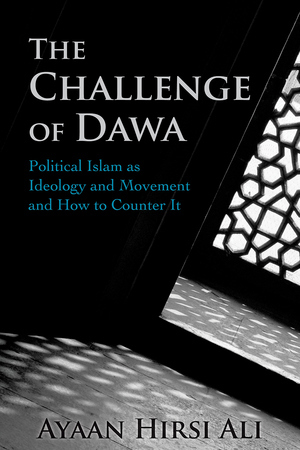Nick Pateras | The Challenge of Dawa
BOOK REVIEW
The Challenge of Dawa: Political Islam as Ideology and Movement and How to Counter It – Ayaan Hirsi Ali
A critical exegesis of political Islam by its most famous apostate
Though this work was published as a long-form report rather than a book, I felt obliged to include it amongst my library of reviews for its percipient and opportune subject matter. As the West struggles with the ramifications of decades of botched foreign policy in the Middle East, the shadow cast by militant Islam grows ever larger. The horrors of 9/11 have been revisited across Europe in recent years, with Islamic extremists’ attacks claiming, amongst several others, the lives of Parisian cartoonists, travelers of Brussels’ airport and attendees of an Ariana Grande event in Manchester, an episode which was not inaccurately construed as a deliberate targeting of youth. These incidents’ ruthless nature and accelerated frequency have driven many to perceive Islamism’s apparent proliferation as the most immediate threat to Western civilization.
"The ultimate goal of dawa is to destroy the political institutions of a free society and replace them with the rule of sharia law."
Amidst the pandemonium of confusion on the root issue and how it is best addressed, Ayaan Hirsi Ali has emerged as a voice of clarity. Exposed from a young age to rigorous Islamic education and practices, including being subjected to genital mutilation at the age of five, she escaped an arranged marriage by fleeing to Holland and has been a vocal critic of Islam ever since. While her sentiments have often drawn the inevitable howls of Islamophobia by a faction of the left, I believe her upbringing makes her uniquely qualified to opine on the faith’s doctrinal hazards.
The content within The Challenge of Dawa’s pages evidences Ali’s superior understanding of Islamism and resembles a stark contrast to the facile rebuttals of those who impugn her efforts. She insists that Islamism is fundamentally political by design, a line with which anyone who has studied the Qur’an will concur, but that it is capable of reformation from within. On only the second page she preemptively notes that while not all Muslims are Islamists, let alone violent, all Islamists are Muslims and their insidious mechanisms necessitate broader public exposure. Herein lies the admirable motive of the report: in 80 pages, Ali casts a spotlight on the constitution of political Islam and its objectives as well as its infrastructure and techniques, before closing with a number of proposed policies.
"The most fundamental distinction between the constitution of political Islam and the constitution of liberty is in their differing approaches to the human individual."
My time researching religion, and Islam in particular, meant little of the report was strikingly novel, though it did underscore the complexity of Islamists’ systems and strategies. Ali identifies well-known organizations like CAIR (The Council on American-Islamic Relations) as Islamist, and cites Saudi Arabia’s funding of dawa activities – $87bn between 1973 and 2002 – as proof of diplomatic acquiescence by its allies. Any indignant reactionaries must also explain or justify the several data points proffered by Ali, including a Science Centre Berlin study that found 65 percent of European Muslims believe religious rules were more important than the laws of the country in which they lived. Such data is selectively presented of course, but corroborates the important premise that not all Islamists need be violent. (One of Ali’s immigration policy proposals with which I disagree however, is the screening of asylum seekers to gauge their ideological compatibility with the host country’s value system. I find this practice morally unpalatable and anyhow foresee it being ineffective.)
Ali’s intellectual leadership and courage demonstrate why she is thought of by so many, including Sam Harris and the late Christopher Hitchens, as a modern day hero. This report embodies her commitment to equality of the genders, to the dignity of human life and of the right to practice religion absent any imposition on others. She claims “in the name of tolerance, the right not to tolerate the intolerant”, a reference to Karl Popper’s well-known paradox. On its surface a catch-22, it is telling that her call to arms reads instead as a call to education.
-NP, May 2017
